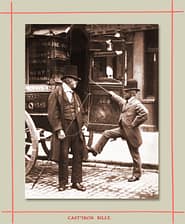
FORTY-THREE years on the road, and more,’’ said Cast-iron Billy; “ and, but for my ‘rheumatics,’ I feel almost as ’ale and ’earty as any gentleman could wish. But I’m lost, I’ve been put off my perch. I don’t mind telling of you I’m not so ’andy wi’ the ribbons as in my younger days I was. Twice in my life I’ve been put off, and this finishes me. I’ll never hold the whip again that’s been in my hand these three and forty year, never! I can’t sit at ’ome, my perch up there was more ’ome to me than ‘anythink.’ Havin’ lost that I’m no no good to nobody; a fish out o’ water I be.”
William Parragreen, known as “Cast-iron Billy,” may be said to have commenced life with the whip in his hand. With an inborn aptitude for the profession he took to the road early. Whip in hand he mounted his father’s cab, and continued for some years to pilot the vehicle through the busy streets of London.
In the days when the Royal Mails ran from the Post Office, with their armed guards and passengers, prepared for long weary journeys, William was fired with the ambition to drive some more imposing conveyance than the old four-wheeler. At last his hopes were realized, and he commenced his career as omnibus driver on the London roads. This event was indelibly fixed in his memory as it happened in 1834, when the old Houses of Parliament were destroyed by fire.
The first locomotive was running successfully between Manchester and Liverpool, although it was regarded by many as a fool-hardy experiment that would speedily come to an end. The first accident on the rails led our hero to believe that the new mode of travelling would not answer. “ There was safety and comfort in the old mail, but to be smashed up into minced meat by steam is the sort o’ thing folks wouldn’t stand.” But he has advanced with the times, and now regards the railroad as the great feeder of his own and every other sort of labour in the metropolis.
Two or three years later William engaged himself to the London Conveyance Company. After fourteen years’ faithful service the stock was sold off, and he was discharged. “ Don’t know if they was broke, or wot. They sold off.” He next found employment with a job-master for about twelve months, but in the end was turned adrift, and two years elapsed before he again obtained regular employment. This, he assured me, was the only time in his life in which he came to grief.
Fortune smiled once more, and he entered as driver to the London General Omnibus Company, in whose service he has ended his career on the road. “Now,” he pathetically remarked, “I’m too old to look ahead. There’s the ‘workus’ on one side; it’s not pleasant, and who knows? on t’other, perhaps, some sporting gent wanting me to keep his gate. I might do that you see I could sit in front fourteen hour out o’ the; twenty-four, always ’andy.” This then is the poor man’s paradise, to have some settled spot where he could sit out his days, in imagination perched on his old seat above his steady-going “cattle.”
He confessed that the post would have its drawbacks. He would miss the scenes of city life, the traffic of the streets, the excitement of racing against opposition. He would miss, too, the greeting of his old patrons, whose front seats were held sacred for the morning and evening journeys. He would lose the run of those whom he had carried to and fro for years, and who, owing to the punctuality of his omnibus at the corner, had risen to fame and fortune. Unlike a well-known aged driver on another metropolitan route, who has amassed two thousand pounds, William was never able to do more than keep things going at home. His first wife was for many years an invalid, and a drain on his resources. His children, who were sickly, needed constant tending. Nor is his poverty to be attributed to intemperance, although he owned to taking “ a drop o’ liquor to keep the frost out in winter, and stave off the heat in summer he also defied any man to say that he had seen him drunk when he should have been sober.
“Nothin’ like old Skyler, one o’ the best whips on the road; he’s over seventy, and rides jobbin’ post,’ or drives to the Derby four-in-hand. But he never goes to bed sober, not if he knows it! He’ll swallow more ‘dog-noses’1Ale, halfpenny-worth, Gin, penny-worth. in a journey than most men livin’.”
The subject of the photograph lost his position as driver, owing to his inability to cope with younger men driving opposition omnibuses along the same route. In this instance the omnibuses crossed each other, the younger and more active man so taking the lead as to pick up all the passengers. This was not all, our veteran had become so enfeebled as to require help to mount his perch, while the reins had to be secured to his coat, as he has partially lost the use of his left hand.
The practice of racing, to the detriment of vehicles and discomfort of passengers, has been in vogue for half a century; but my informant remarked that in the “ good old days” the struggle raged much more fiercely than it does now. Then there were many small proprietors running a neck-and-neck race for a living. The large companies which now monopolize the routes have in some measure tended to check the evil. At the same time the daily earnings of each conveyance depends so much on the joint efforts of driver and conductor, that they do not scruple to urge on their steeds when it suits their convenience. The demands thus made upon the strength of the horses soon renders them unfit for the road. I have been assured by more authorities than one that such horses as are employed will, on an average, stand omnibus work no longer than eight years. It is curious to observe that both horse and conveyance must be renewed at about the same time. I gather from the Police Report for 1875 that in six years 8180 public conveyances were condemned as unfit for use. In 1875, 9684 licences were granted for public conveyances in the metropolitan district. It will be seen, therefore, that the whole of the public conveyances of London are renewed about , every eight years. The number of omnibuses running last year within the metropolitan area was 1448; horses, allowing ten to each omnibus, 14,480; drivers, conductors, and horse-keepers, 4344.
The men employed in omnibus work are, as a class, fairly healthy, notwithstanding their exposure to all weathers, and that they labour fourteen hours out of every twenty-four. The supply of men flows from a great variety of sources; the majority of the drivers have been trained early in the management of horses. In some cases the education thus bestowed has been so purely professional as to leave the men ignorant of the most rudimentary branches of knowledge. For all that, some of them have filled better positions, they have owned their own studs, and driven their own coaches. One I may mention was at one time a man of property, and an authority on all matters relating to the “turf”. Early in life he made up his mind, seemingly, to spend his money, and to live merrily while it lasted; and when his funds were gone he settled down, cheerfully enough, to driving an omnibus. Quite recently he has come in for a windfall, in the shape of a legacy of over a thousand pounds. Immediately on his receiving the money he descended from his perch, and was last seen lolling over the bar of a restaurant, smoking a fragrant cigar, and wearing a suit most horsey and juvenile; a white hat, tilted so as to partially shade the left eye, would have completed his attire, but for a narrow black band with which it was adorned. The band was possibly worn in grateful remembrance of the friend who left him the money, or of the money that had already gone in procuring some fleeting pleasure for its owner. Be that as it may, when the legacy has been squandered its owner will doubtless resume his seat on the box. Omnibus conductors are drawn from the ranks of unfortunate clerks, mechanics, and tradesmen of all sorts. No special training being required for the duties of a conductor, the post is open to all comers who can read and write, and who can produce some satisfactory reference as to character. The pay is 4s. a day, but the “black mail” exacted from them in various ways renders it almost impossible for them to exist on their pay. There being, moreover, no proper check on their drawings, the men are exposed to the greatest temptations. It is in some instances tacitly understood by employers that the taxes imposed on conductors (for tips and treats to driver, horse-keeper, &c., &c.) shall be taken from the fares were this not so, and the conductor strictly honest, his fourteen hours’ work would go for next to nothing.
Would it not be possible, in the interest of masters and men, to let out the omnibuses by the day ? To adopt indeed the system in force with hackney carriages. The masters would require to find time-keepers, and appoint inspectors to prevent racing, and to limit the number of journeys. Although the number of omnibuses running int he metropolis is perhaps not so great as before the introduction of city lines and tramways, they are again steadily increasing to meet the demand of a growing population.
A great reduction in fare followed the laying of railways and tram-lines; but there has been no diminution in the gross earnings of the omnibuses. This is accounted for in two ways, the abolition of mileage and tolls, and in short journeys. When Henry Mayhew wrote on this subject, the mileage tax on each conveyance was three halfpence for every mile traversed seventy miles being the average distance per day,; the charge for mileage was eight shillings and nine pence. In some of the routes the toll charged was tenpence per journey, or five shillings for the day’s work of six journeys. The abolition of these imposts conferred a great boon on the public, as under the old system omnibuses could not run at the present low fares and yield a profit to their owners.
In conclusion I must thank Mr. Smith, of the City Mission- the pioneer missionary to omnibus men—for his introduction to “Cast-iron Billy.”
A.S.
- 1Ale, halfpenny-worth, Gin, penny-worth.
